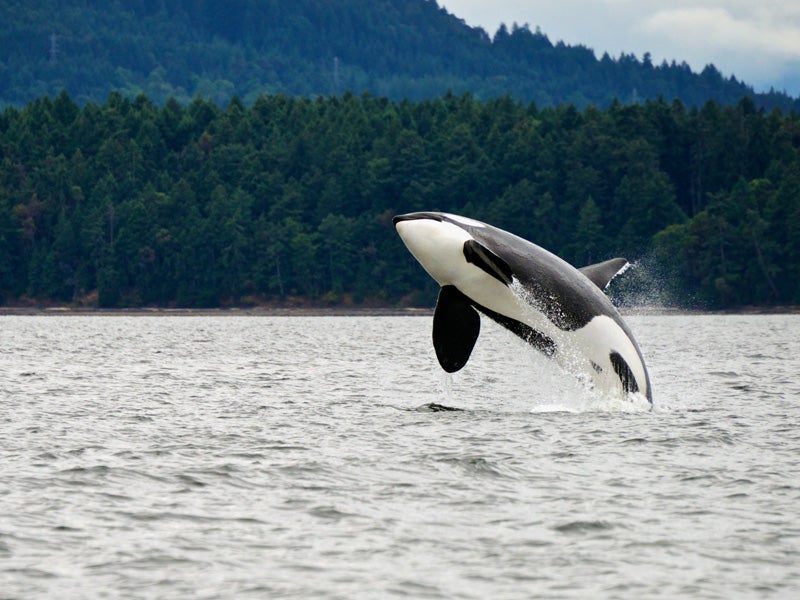Captive Orca Swims Closer to Freedom
The federal government will finally put a captive orca named Lolita on the endangered species list, a move that may open doors to her eventual return home to the Puget Sound in Washington state.

This page was published 10 years ago. Find the latest on Earthjustice’s work.
Recently, the federal government added a captive orca called Lolita to the endangered species list—leaving open the possibility that Lolita may one day return to her home in Washington state waters.
Lolita currently resides at the Miami Seaquarium, brought there by trappers in the 1970s after she was captured along with six other orcas when they were still young enough to be trained for entertainment and sold to marine parks. More than 40 years later, Lolita remains the only surviving captive orca from those days.
The government’s decision to protect Lolita as a member of the endangered southern resident killer whale population could be good news for both Lolita and the imperiled population to which she belongs. The southern resident orca population ranges as far south as Monterey Bay, but spends much of its time in the protected waters of Puget Sound and the Salish Sea. Over the years, the effects of removing Lolita and other individuals from this population in the 1970s, combined with a severe decline in chinook salmon (their primary prey), toxic pollution and habitat degradation, have reduced this group of critically endangered killer whales to a mere 80 individuals.
In 2005, Earthjustice litigation succeeded in getting the southern residents protected under the Endangered Species Act. Since then, we’ve worked hard to enforce the act by protecting the orcas from further harm from toxic stormwater pollution and Navy sonar training. We’ve also continued efforts to secure an adequate supply of chinook salmon for the orcas. Last year, Earthjustice litigation forced the government back to the drawing board to apply the best science and consider the harmful short and long-term effects of sonar in coastal waters from Washington state to northern California. We continue our work to turn that court ruling into much-needed protection for orcas and other whales off the coasts of Washington, Oregon and northern California.
Unfortunately, Lolita was not included in the original ESA listing, which prohibits the “take” of any listed species. Take is defined as harassing or harming a member of a listed species and could include harm caused in captivity. When anyone engages in activities that by their nature may harm species—such as offshore oil drilling or sonar testing—they must get approval from the government for “incidental take” permits.
When the National Marine Fisheries Service initially suggested that returning Lolita home might be considered a “take,” Earthjustice weighed in on behalf of orca advocates and scientists to highlight that potential reintroduction into her native waters could actually benefit both Lolita and the rest of the population and urged the agency not to predetermine what’s next. In response to those comments, the agency made clear in its final rule that it would reserve judgment until it reviewed the scientific merits of specific reintroduction proposals.
Now that the government has listed Lolita, orca advocates are hopeful that the listing will improve her living conditions and maybe even result in her return to her home waters, where she might be accepted into her family pod or at least live out her years in retirement under human study and care in her natural habitat. In either case, she could contribute important scientific information about the role of post-reproductive females in this matriarchal population and about the potential sources of toxins in the food web.
While those proposals are developed, Earthjustice will continue its efforts to protect all southern resident orcas from harmful activities like Navy training exercises, while we work to restore the salmon and clean water that these orcas—and we humans—need to thrive.
To learn more about this issue, check out this podcast with Patti Goldman, Managing Attorney, where she discusses her efforts to protect the orca whales that make Puget Sound their home.